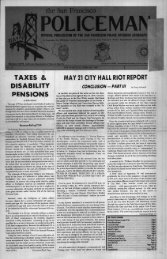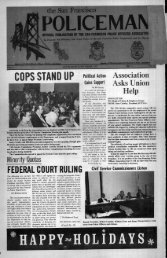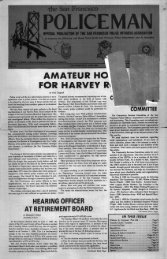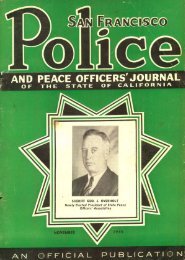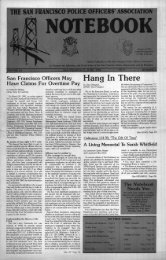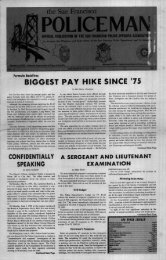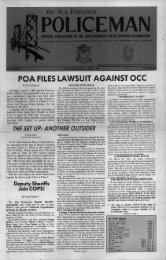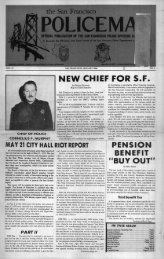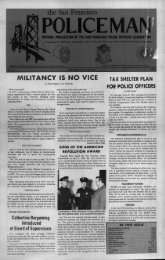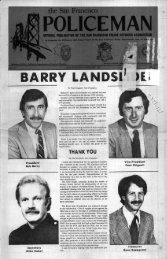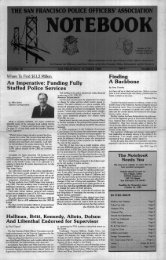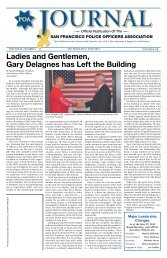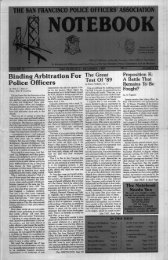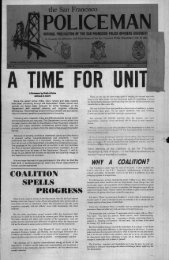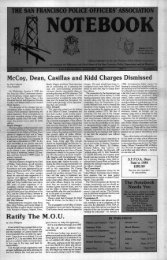August 1989 - San Francisco Police Officers Association
August 1989 - San Francisco Police Officers Association
August 1989 - San Francisco Police Officers Association
- No tags were found...
You also want an ePaper? Increase the reach of your titles
YUMPU automatically turns print PDFs into web optimized ePapers that Google loves.
<strong>August</strong>, <strong>1989</strong> Notebook Page 9<br />
The Interview—How It Starts<br />
And How It Stops<br />
by Robin Ririe M.A.<br />
The traditional question asked by the interview<br />
board to get the candidate talking<br />
is "Tell us something about you." and the<br />
traditional answer is a life or work history.<br />
This is not what the question is asking for.<br />
In most cases the interview board will have<br />
some information about the candidate<br />
before the interview starts (it might be<br />
resume, an application form or the person's<br />
personnel file). By reciting your history all<br />
that's being done is telling the board what<br />
they've already read.<br />
information.<br />
The traditional question asked by the interview<br />
board to get the candidate talking<br />
is "Tell us something about you?" and the<br />
traditional answer is a life or work history.<br />
This is not what the question is asking for.<br />
In most cases the interview board will have<br />
some information about the candidate<br />
before the interview starts (it might be<br />
resume, an application form or the person's<br />
personnel file). By reciting your history all<br />
that's being done is telling the board what<br />
they've already read.<br />
The purpose of the interview is "to sell<br />
yourself as you fit the new job or position".<br />
To explain that you are the best at doing<br />
your present job, is telling the board don't<br />
move or promote me because you will be<br />
losing the best employee in that position.<br />
You must, from the beginning, tell the<br />
board that you are prepared and have the<br />
skills, aptitude, characteristics and talents<br />
to perform the new job.<br />
Here are some guidelines for the foundation<br />
of your interview. The foundation<br />
that you will build the interview upon is called<br />
the introductory or opening statement.<br />
1. Get the board's attention. You have<br />
2-3 seconds to do this. You can use a<br />
quote from a famous person you admire,<br />
or a one liner that you feel fits you and your<br />
strengths. A current need of the department<br />
or company that you uniquely fill. Example:<br />
"Knowledge is the key to achievement.<br />
I have the skill to teach complex information"<br />
Notice that this does not have<br />
to be a complete thought, just a preview<br />
of things to come.<br />
2. Introduce yourself and any unique<br />
talents or skills that you might have so long<br />
as they apply to the new job or position<br />
not the old one. This should take about 10<br />
seconds. This is the first part of the old<br />
adage "Tell them what you are going to tell<br />
them, tell them and tell them what you told<br />
them". The body of the opening statement<br />
is the second part or the "tell them", and<br />
the closing statement is the last part or the<br />
"tell them what you told them". More about<br />
the closing statement later in the article.<br />
This part of the opening is not explanatory.<br />
It's just a brief outline of what<br />
you are going to tell them in the body of<br />
the statement. This will give the board a<br />
chance to form positive opinions about you<br />
and guide them in asking pertinent<br />
questions.<br />
3. This is the heart of the opening statement<br />
and works best if you have chosen<br />
3 or 4 strengths or skills to talk about in<br />
brief detail. Each of the skills, strengths or<br />
characteristics that you choose needs to be<br />
backed up with a story/personal experience.<br />
This must be real life, true and<br />
personal, that you have lived, not<br />
something made up because it sounds<br />
good. There are two reasons that we use<br />
true stories; the first is, if you lived it you<br />
don't have to memorize it. The second is,<br />
anything that you say can be tested or<br />
challenged and if you lived it you can defend<br />
or explain it.<br />
I recommend that you have no more<br />
Phone 333-9111<br />
Ed's Package House<br />
LIQUOR BEER WINE<br />
105 Broad Street<br />
ED. EASTMAN <strong>San</strong> <strong>Francisco</strong>, CA 94112<br />
than four topics to talk about, and so you<br />
don't get lost or confused as you talk, use<br />
your fingers to keep track of which one you<br />
are talking about. I assign a topic to each<br />
finger on my left hand and then hold the<br />
finger that corresponds to the topic that Pm<br />
talking about. Then if I lose my place or<br />
draw a blank, I just change fingers and start<br />
talking about the next new topic.<br />
My recommendation is that each topic<br />
gets no more than 40 seconds. This is long<br />
enough to cover the subject yet keeps you<br />
from rambling. It also serves the board, in<br />
that they can follow what you are saying<br />
for about 40 seconds. After that their<br />
minds start to wander, and we don't want<br />
that now do we? Remember these 4 topics<br />
must apply to the new position and how<br />
you fit it.<br />
The last part of the opening statement<br />
is a line telling the board that you are<br />
through and are ready to answer wny questions<br />
about what you have said.<br />
The most common response I get to this<br />
type of an opening statement is "if J don't<br />
tell them about where I've worked then they<br />
will not know about my varied background<br />
and experiences". The object of the interview<br />
is to tell the board how you will fit into<br />
the new job, not how well you may have<br />
performed in the old one.<br />
In talking about your skills, accomplishments<br />
and strengths I suggest using<br />
the acronym T-Bar. By using T-Bar you<br />
make sure you cover the information in a<br />
clear and concise manner, yet it keeps you<br />
from rambling and eliminates the need to<br />
memorize.<br />
T - Topic or title sentence. What is it you<br />
want the board to know about you? Most<br />
of us have a tendency to tell all about what<br />
we've done or how we did something and<br />
then at the end we tell what it was. I guess<br />
we think our accomplishments are a<br />
suspense thriller. In an interview it's best<br />
to be up front with the interviewer and tell<br />
them what we are going to talk about.<br />
B - Background. This is the where did<br />
you get the experience or skill. This is<br />
where your work experience comes into<br />
play. It is not however a long winded explanation<br />
of where you worked but the<br />
value of what you learned from where you<br />
worked.<br />
A - Action. What did you do, what jobs<br />
did you perform, what skills did you acquire<br />
and how did you use them. Don't describe<br />
the project in detail. What the board is<br />
looking for is your action, your involvement<br />
and your ability to work as part of a team<br />
and how you functioned.<br />
R - Results. Tell what you accomplished<br />
and the value to your employer. This<br />
is where you toot your own horn without<br />
sounding like a braggart. Be clear, concise<br />
and specific.<br />
Remember each of the T-Bars can take<br />
a maximum time of 40 seconds and no<br />
more; however, it can be less. The total<br />
time allowed for the opening statement is<br />
4 minutes. The best time is about 31/2<br />
minutes.<br />
The last part of an interview is the cbs-<br />
JEFF<br />
<strong>San</strong>d<br />
dba southpark fabricators<br />
136 South Park<br />
<strong>San</strong> <strong>Francisco</strong> 94107<br />
415/974-6622<br />
ing statement. This is the "Tell them what<br />
you told them". This is not the time to try<br />
to go back and answer an earlier question<br />
that you think you screwed up. This is not<br />
the time to bring up new information that<br />
you forgot to talk about during the interview.,<br />
This is just what it says "Closing".<br />
The number one mistake made in closing<br />
is to say in response to the question "Do<br />
you have anything else to say or add to the<br />
interview or anything we've forgotten?. "No<br />
I think we've just about covered it all". Boo<br />
Hiss. That is asking the board to score you<br />
on the statement "No, that's all".<br />
The board will not remember the opening<br />
statement nor will it remember the<br />
specific answers you gave unless you were<br />
caught in a lie. They will, however,<br />
remember the closing statement. So Make<br />
One.<br />
The closing statement is brief and to the<br />
point, 10 seconds, and has 4 parts. 1. Get<br />
the attention of the interviewers. The board<br />
is expecting a long winded dissertation<br />
about something that was discussed<br />
earlier. As a result they have mentally cut<br />
you off and have begun the scoring process.<br />
You must do something to get their<br />
attention. Raise your voice and at the same<br />
time sit up in your chair. Remember; this<br />
is your last chance to have them hear you.<br />
2. Remind the board of your strengths,<br />
skills or the characteristics you talked<br />
about in your opening statement. Use only<br />
one or two words to describe each of<br />
these. This will refresh their memory of<br />
your unique qualifications for the position<br />
and will help separate you from the other<br />
candidates.<br />
3. Tell the board that you are ready and<br />
prepared to accept the position (give them<br />
the full title of the position), for, (give the<br />
name of the department, the city or county).<br />
This is a bold and straight forward<br />
statement. Don't be bashful, if you don't<br />
ask for the position how can you expect<br />
to get it.<br />
4. Thank them, keep this very short.<br />
Remember the whole closing is only 10-15<br />
seconds long. After saying thank you,<br />
pause about one second, stand up and extend<br />
your hand to the person that is the<br />
a<br />
110 Jfl()<br />
4115 Judah<br />
SF, CA<br />
664-7779<br />
THEJ MANSION HOTEL<br />
DENISE MITIDIERI<br />
MANA(;INC 1)1RICI OR<br />
2220 SACRAMFN 10 SI RUI'<br />
SAN FRANCIS( (), ('Al Il-( )RNI.\ 94115<br />
PHONE: (1150929-914<br />
Mission High School<br />
50th Reunion<br />
The classes of June & December<br />
1939 of Mission High School, <strong>San</strong><br />
<strong>Francisco</strong> will hold their 50-year reunion<br />
on Saturday, October 21,<br />
<strong>1989</strong>, at the Grosvenor Airport Inn<br />
in South <strong>San</strong> <strong>Francisco</strong>. To help in<br />
the reunion effort, please contact Iris<br />
Conti Allegrini, 97 Lapham Way,<br />
<strong>San</strong> <strong>Francisco</strong>, 94124. Or phone Iris<br />
(415) 584-6314.<br />
furthest from the exit. Shake that person's<br />
hand calling them by name. If you can't<br />
remember the name of each person then<br />
don't remember any of the names. Nothing<br />
is worst than saying "Thank you Mr.<br />
Smith, Thank you Ms. Brown and thank<br />
you Mr. Ah, ah, ah — sir.<br />
As soon as possible after the interview<br />
write down all the questions asked of you<br />
and the answer you gave. This will give you<br />
an idea of how well you did. Last, but not<br />
least, let me remind you that attitude is the<br />
key to any interview. Attitude is worth<br />
80% of your score. Believe in yourself and<br />
your ability and you will do well.<br />
Robin Ririe retired from the Los Angeles<br />
<strong>Police</strong> Department in 1986 after 26 years<br />
to pursue a career in teaching and lecturing,<br />
forming his own seminar company.<br />
Since 1979, Robin has been coordinating<br />
and conducting seminars and<br />
workshops throughout California and<br />
Arizona. His classes are lively - his information<br />
is current and comprehensive - his<br />
advice is incisive. He is a people mover!<br />
As a speaker, Robin is actively sought<br />
by professional and community organizations.<br />
His topics include various careerrelated<br />
subjects.<br />
For information on upcoming seminars<br />
or individual help with interviews, contact<br />
Robin Ririe at 29 South Curtis Ave.,<br />
Alhambra, Ca. 91801, or you can call him<br />
at (818) 284-1724.<br />
1020 Harrison<br />
<strong>San</strong> <strong>Francisco</strong>, CA. 94103<br />
Tel: (415) 255-6099<br />
FAX: (415) 255-6098<br />
Quality Craftsman, Inc.<br />
FINE ARCHITECTURAL WOODWORK<br />
Hunters Point Shipyard, Bldg. 363/No. 103, <strong>San</strong> <strong>Francisco</strong>, CA 94124<br />
(415) 822-2161<br />
P16<br />
IIiiiE<br />
Cont. Lie. 355538<br />
<strong>Police</strong>/Security<br />
Equipment<br />
* Batons<br />
* Firearms<br />
* Ammunition<br />
* Tear Gas<br />
* Holsters<br />
* Protective Equipment<br />
1 H •E<br />
RECORD<br />
RACK<br />
3897 18th St. - <strong>San</strong> <strong>Francisco</strong>, CA 94114 (415) 552-4990



